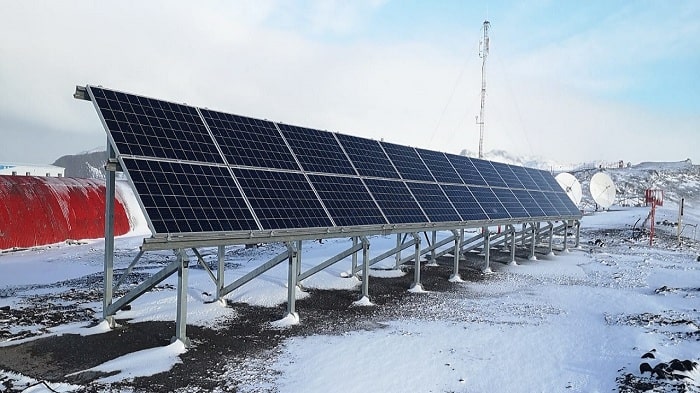ABB continues its innovative work with the Uruguayan government agency Instituto Antarctico Uruguayo (IAU) by providing solar power solutions for a second installation at the IAU’s research base in the Antarctic, helping facilitate crucial climate change research.
With a strong track record of reducing its country’s dependency on fossil fuels, the IAU – together with project lead, the Uruguayan utility company UTE and the Ministry of Industry, Energy and Mining (MIEM) – wanted to strengthen the use of PV (photovoltaic) systems at the Artigas base to further increase the use of renewable energy instead of using stand-by diesel generators.
The base enables the IAU to carry out crucial scientific research into climate change – a vital resource as many of the world’s largest global economies work towards a target of net zero carbon emissions by 2050.
In 2018, ABB solar solutions played a critical part in establishing the first solar system at the Artigas Base, so it was the natural partner for this second major PV installation in 2019.
Francisco Manfredi, Service Sales Specialist at ABB added: “We were able to take the considerable learnings from the first installation in 2018 and apply them to this project. Hence, we were able to provide an even more reliable solution and support the IAU in its goal of powering Artigas by renewable energy. The results so early into the project are fantastic and will help contribute to vital scientific research as the world reduces its reliance on fossil fuels to meet its climate challenges.”
Working with installer, Smart Green Uruguay (SGU), the team had to negotiate harsh and inhospitable conditions to complete the installation in just three days. With the first project, the solar panels had been mounted onto building walls to minimize wind interference. However, this meant the position of the panels were not at the optimum tilt of 55° North, resulting in a compromised performance. Taking this learning into the second installation, the solar panels were ground mounted, achieving a better position for sunlight to ensure maximum performance.
As a result, during sunlight hours in summertime, up to 10 percent of the instant power demanded by Artigas Base can be provided by the optimized solar plant. It has already offset 0.8 metric tons of carbon emissions in the first two months since its installation – reducing Artigas’ impact on the delicate Antarctic ecosystem, and creating operational (OPEX) savings that will be put back into critical scientific research.
After successfully proving its reliability and durability in the first installation, the ABB solution included its solar inverter UNO-DM-6.0-TL (6kW at 230VAC 1ph), MCB 40A 2-pole and RCD 40A 300mA 2-pole, 24 ground-mounted solar panels JINKO 270W (12 modules per string), and a connection to ABB’s Aurora Vision Plant Management portal via the inverter’s embedded wi-fi interface.
The Aurora Vision portal provides the ability to remotely monitor the performance of the installation, so the teams involved could compare the new solar plant’s performance to the existing panels – gathering invaluable insight and data to inform future expansions. IAU also made the portal available to view real-time online, encouraging public engagement with the base’s sustainability efforts.
ABB’s plug and play solar inverter also meant that installation was significantly simplified, and it took only three days to install the PV system. Due to the harsh and unpredictable weather conditions, and the short timeframe to complete the installation, ABB pre-configured the equipment by testing it in a laboratory that recreated the adverse Antarctic environment. ABB then provided extensive training for the installers, and real-time support to SGU throughout the installation via the Aurora Vision Management platform.
Diego Giacosa, engineer at UTE, commented: “This was a very challenging project, which was only possible to deliver if everybody worked as a team. The insights gleaned from the management platform enable us to track, monitor and diagnose issues before they arose, helping us manage teams and resources effectively. We are encouraged by the results and solar is a reliable fuel choice to help us meet zero carbon targets.”
ABB is a pioneering technology leader with a comprehensive offering for digital industries. With a history of innovation spanning more than 130 years, ABB is today a leader in digital industries with four customer- focused, globally leading businesses: Electrification, Industrial Automation, Motion, and Robotics & Discrete Automation, supported by its common ABB Ability™ digital platform. ABB’s market leading Power Grids business will be divested to Hitachi in 2020. ABB operates in more than 100 countries with about 147,000 employees. www.abb.com





































